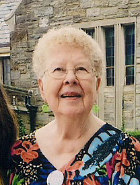Honk Poem by Sandy Fulton
Honk
I came into my teens the year we lived
in a small village along the mile-wide Mississippi,
renting an old cottage on stilts, about ten yards from the river with
waterlines high on the wallpaper. Deeply penciled dates made by the landlady
marked the floods that made those lines.
We had no floods that year. What we had were
geese, thousands of Canada geese
flying south, using our river between Illinois and Iowa as their motel,
in military files on the golden leaf-piled riverbank and translucent winter ice
as far as I could see up or down the river.
For weeks geese flapped on and off, soared away south, honking,
while new ones arrived, honking.
All day they loved to honk.
In our one-room schoolhouse down the street
some of them strutted the schoolyard, searching for our lunchbox sandwich crusts,
honking louder than the lessons of the harried teacher. I learned from the geese that
they took turns leading the flight formation,
cared about each other,
flew no faster than their eldest and youngest,
purposefully slow to save all the flock,
knew where they were going and why and how, and were determined to get there.
Now every week I stand with others of my species, lined up like those geese
along a well-traveled avenue in East Mount Airy, waving a sign that sometimes says
Black Lives Matter.
But because we have a large banner on our church
conveying those words to drivers and riders,
I prefer to hold a sign reading Honk for Justice.
Most of the travelers notice us and honk, noisy as the cacaphony of geese
with loud airhorns, city bus blasts, beeps of mini-cars, sometimes waving hands from windows
like flapping wings.
Honkers of many colors demand justice for neighbors whose skin color makes them visible
targets of weak members of our human species who crave unjust dominance, even murder,
for no reason but a moment's
surge of power over someone whose integument displays a
darker shade of tan than the predator considers justifiable.
The persecuted people answer their predators
with cooperative action, peaceable like the geese—and as noisy.
They are not alone. We who are pale stand with our darker friends.
I am learning that I stand on thin ice. For the sake of my soul I remember the dead,
wave my sign. We are there to alert others, to make them care.
Perhaps we may warn wannabe killers, or shame them
to prevent the deaths of some who could have been victims.
First we must prioritize those most in peril and extend our help. Doctors call that 'triage.'
That is why black lives especially matter.
But we need to remember the geese, stand up for them and every living creature—
maintain the flyovers, the feeding grounds and birth sites, respect the mutual aid
of all animals and plants including the smallest living things and mute processes of life
that cannot plead for themselves.
When we don't pervert the meaning to excuse our own bigotry or apathy,
it's true that all lives matter.
This poem has not been translated into any other language yet.
I would like to translate this poem